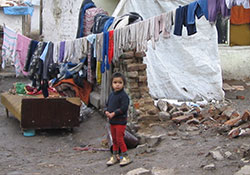Tailoring immunization to the needs of susceptible populations

WHO/Emilia Tontcheva
Immunization programmes have not been well equipped to define specific subpopulations and deliver campaigns and services shaped to their needs and preferences. To help tackle this problem, WHO/Europe developed an innovative toolkit that it will pilot-test as part of a new project in Bulgaria, in collaboration with the country’s Ministry of Health, the National Centre for Infectious and Parasitic Diseases and local civil-society organizations.
The project will test a series of tools for tailoring vaccination responses to the unique needs of targeted susceptible populations, to encourage parents to vaccinate their children according to national immunization schedules. During a first mission to Bulgaria in May, a WHO/Europe team met national counterparts and key stakeholders, and began to identify pockets in marginalized and Roma communities that were at risk of vaccine-preventable diseases.
Dr Angel Kunchev, Bulgarian Chief State Health Inspector, has wholeheartedly supported the project since its conception in December 2010. “We are eager to test the technology, impatient to witness the results we believe it will have and proud to be the first country globally to apply such techniques on an immunization programme,” he said.
The pilot project is due to run for six months, and WHO/Europe aims to make the toolkit available to other Member States in early 2013.
Immunizing at-risk and vulnerable populations in Bulgaria
Nadezhda (Hope), one of Bulgaria’s largest Roma settlements, is home to 15% of the population of Slivengrad, the country’s eighth-largest municipality. The 20 000 people in Nadezhda live close together in an area no larger than a dozen football fields. Prejudice and mistrust exacerbate the effects of poor sanitation and hygiene, and low penetration of public services, including health services.
In 2009–2010, a large measles outbreak in Bulgaria caused illness and deaths in Nadezhda. The outbreak hit such communities hardest owing to poor vaccination coverage. Despite excellent immunization campaigns to stop the outbreak, vaccine uptake for measles, diphtheria, poliomyelitis and rubella remains lower in Nadezhda than elsewhere in the country.
“One of our greatest challenges to date has been how to design health interventions that reach diverse user groups. Here in Bulgaria, we acknowledge this tool can strengthen our ability to reach the targets set in the action plan for implementation of the national Roma integration strategy – particularly the improvement of medical care for newborn babies and children of pre-school age,” said Ms Emilia Tontcheva, Head of the WHO Country Office, Bulgaria.
WHO/Europe behaviour-based immunization toolkit
The new toolkit aims to support countries in understanding the motivational, environmental (supply-side) and ability determinants that influence vaccination behaviours of at-risk and vulnerable populations. It comprises:
- formative research guides;
- a framework of social and behavioural determinants within which to explore target populations’ motivations and barriers to vaccinate; and
- a menu of good practices and lessons learnt from immunization programmes around the world.
Member States that adopt the toolkit will be trained to profile and segment susceptible populations epidemiologically and socially, and to respond appropriately according to their circumstances, social and behavioural barriers, and communication and media preferences.
Challenges to immunization
Many countries in the WHO European Region face challenges similar to those of the Bulgarian immunization programme in meeting the needs of people in communities like Nadezhda.
Failing primary care services, stigmatization and risk perception all affect the equity (in terms of different people’s access to and use of) of high-quality health care. This in turn affects the incidence of vaccine-preventable diseases such as measles. In 2010, the Strategic Advisory Group of Experts on Immunization (SAGE) acknowledged that, if the European Region did not work to change behaviour and show increased demand for immunization, it will not achieve its goal of eradicating measles and rubella by 2015.
Simply telling people why they should vaccinate or giving them information and expecting them to act on it may not work if immunization programmes do not consider the benefits that people understand they will gain. By taking a more consumer-centred approach, social marketing enables a programme to understand its target audience and thus take the most appropriate and effective approach.
People have many reasons for avoiding vaccination for their children or themselves. These range from complacency, lack of access or inconvenience to lack of confidence in vaccines or the services that provide them. In the complex and diverse European Region, each country needs to have the capacity to correctly diagnose such reasons, design unique responses and tailor communications or service delivery to meet the needs of susceptible populations. The toolkit aims to help countries build and strengthen this capacity, and the pilot project in Bulgaria will be the first test of its effectiveness.



